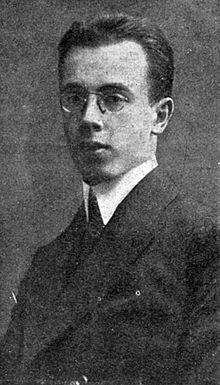Dmitrii Bogrov | |
|---|---|
דמיטרי בוגרוב | |
 Bogrov in 1910 | |
| Born | 10 February 1887 |
| Died | 25 September 1911 (aged 24) Kyiv, Russian Empire |
| Cause of death | Execution by hanging |
| Occupation | Lawyer |
| Known for | Assassination of Pyotr Stolypin |
| Political party | Socialist Revolutionary Party |
| Movement | Revolutionary socialism, anarchism |
| Criminal charges | Murder |
| Criminal penalty | Capital punishment |
Dmitrii Grigor'evich Bogrov (Russian: Дмитрий Григорьевич Богров; 10 February [O.S. 29 January] 1887 – 25 September [O.S. 12 September] 1911) was a Ukrainian Jewish lawyer, known for his assassination of the Russian prime minister Pyotr Stolypin.
Raised in a wealthy Jewish family in Kyiv, Bogrov developed sympathies for revolutionary socialism from an early age and became involved with the Ukrainian anarchist movement while studying law at university. Disillusioned by the local anarchist group's activism, he was hired as an informant by the Okhrana and kept tabs on the group's activities. After graduating, he moved to Saint Petersburg in order to practice law and seek safety from the rising environment of antisemitism in the Russian Empire.
Disturbed by the pogroms in the Russian Empire and feeling guilty for his collaboration with the police, he began to plot the assassination of the Russian prime minister Pyotr Stolypin, who he held responsible for the attacks. He unsuccessfully attempted to elicit the support of the Socialist Revolutionary Party, which caused him to have a nervous breakdown. After returning to Kyiv, he was confronted by members of his former anarchist group, who had discovered his involvement with the Okhrana and made threats against his life for it.
He again resolved to assassinate Stolypin. He told the Okhrana that assassins were planning to kill a government official, convincing them to grant him a ticket to the Kyiv Opera House, where the prime minister was due to attend a play. Having convinced the authorities that he was still on their side, he managed to get close to the prime minister and shot him twice. Stolypin died four days later. Bogrov himself was executed days after his target's death.
Bogrov's actions have become the subject of conspiracy theories, as well as numerous historiographical debates about his motives.